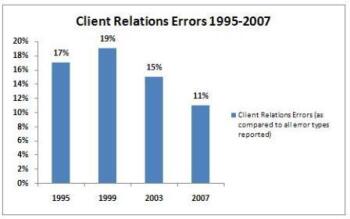Client Relations For Solos and Small Firms
 Solos and small-firm attorneys are the most likely targets of legal malpractice claims.
Solos and small-firm attorneys are the most likely targets of legal malpractice claims.
According to the American Bar Association, most malpractice lawsuits are filed against lawyers in firms with one to five attorneys.
Why is this so? There are a number of reasons: the lack of in-house information technology experts, small administrative budgets, small or nonexistent support staffs, isolation, large caseloads.
Mostly, though, the malpractice numbers reflect the fact that a large majority of lawyers practice in solo and small firms.
So what is the solo to do?
Start with excellent client relations. Following are some tips:
- Communication is key. Maintain constant contact with the client regarding the status of a matter—even if there is little or nothing going on. Nothing frustrates clients more than not hearing from their attorney for some time. Clients need to know you haven’t forgotten about them. Let them know you are still working on their case. Explain that there might be long lulls of inactivity that are simply part of the legal process.
- Choose good clients. Here’s the truth: excellent clients are screened and selected with rigor and precision. Perhaps you cannot be terribly selective with your cases. Maybe you have no say in the matter. What you do have is the choice to do your very best with what you have to work with.
- Practice saying no. You have no ethical duty to accept every client that shows up in your office. Sometimes the smart and compassionate move is to send clients on their way.
- Watch out for problem clients. Some clients are too needy, and some don’t play well with others. Some beg too much, while others roll over too easily. Look for personality traits in the initial meeting that might suggest trouble down the road. Remember as you take on a new matter that you are putting your license and reputation on the line, not to mention your sanity.
- Put the representation agreement in writing. Document the scope of your involvement in all legal matters to avoid any confusion as to what you were hired to do. If you have not been hired to provide an assessment of the merits of a transaction, such a statement should be included in the engagement agreement in clearly identifiable terms.
- Use all available means. Phone calls, texts, emails, personal conferences or a mere description of activity on an invoice help clients understand what’s going on.
- Take the lead. Cooperation between client and counsel is essential for a happy outcome. But disaster strikes if either forgets which one has the law license.
- Do a great job. Successful cases are self-perpetuating. The best way to get new clients is to do a great job for the ones you have now. The referrals will follow.
- Listen to clients. Lawyers tend to be better talkers than listeners. It’s part of our training: to argue, extol and pontificate. But sometimes our clients and colleagues – even our adversaries – have important things to tell us, if only we take time to listen.
- Build trust. Our jobs become easier when our clients trust us. We don’t have to worry so much about covering ourselves or watching our backs. But trust is a fragile thing. Once lost it is difficult if not impossible to recover.
- Chasing your tail won’t get you anywhere. It will only make you dizzy. Know when to call it quits – in a line of questioning, an argument or an entire case. Remember that the easiest way to get out of a predicament is to not get into it in the first place.
- Plan for greatness. Good lawyers look ahead. As soon as one case ends, they turn eagerly to the next one. They enjoy what they do, and they can’t wait to meet their next client.
Jay Reeves is an attorney licensed in North Carolina and South Carolina. He has practiced in both states and was Legal Editor at Lawyers Weekly and Risk Manager at Lawyers Mutual. He writes the Risk Man column of practice pointers and risk management tips. Contact jay.reeves@ymail.com or phone 919-619-2441.




